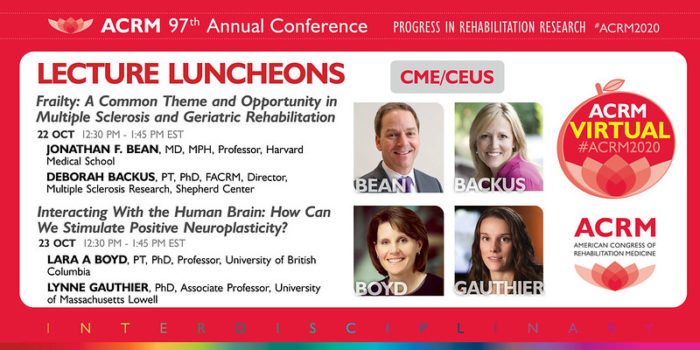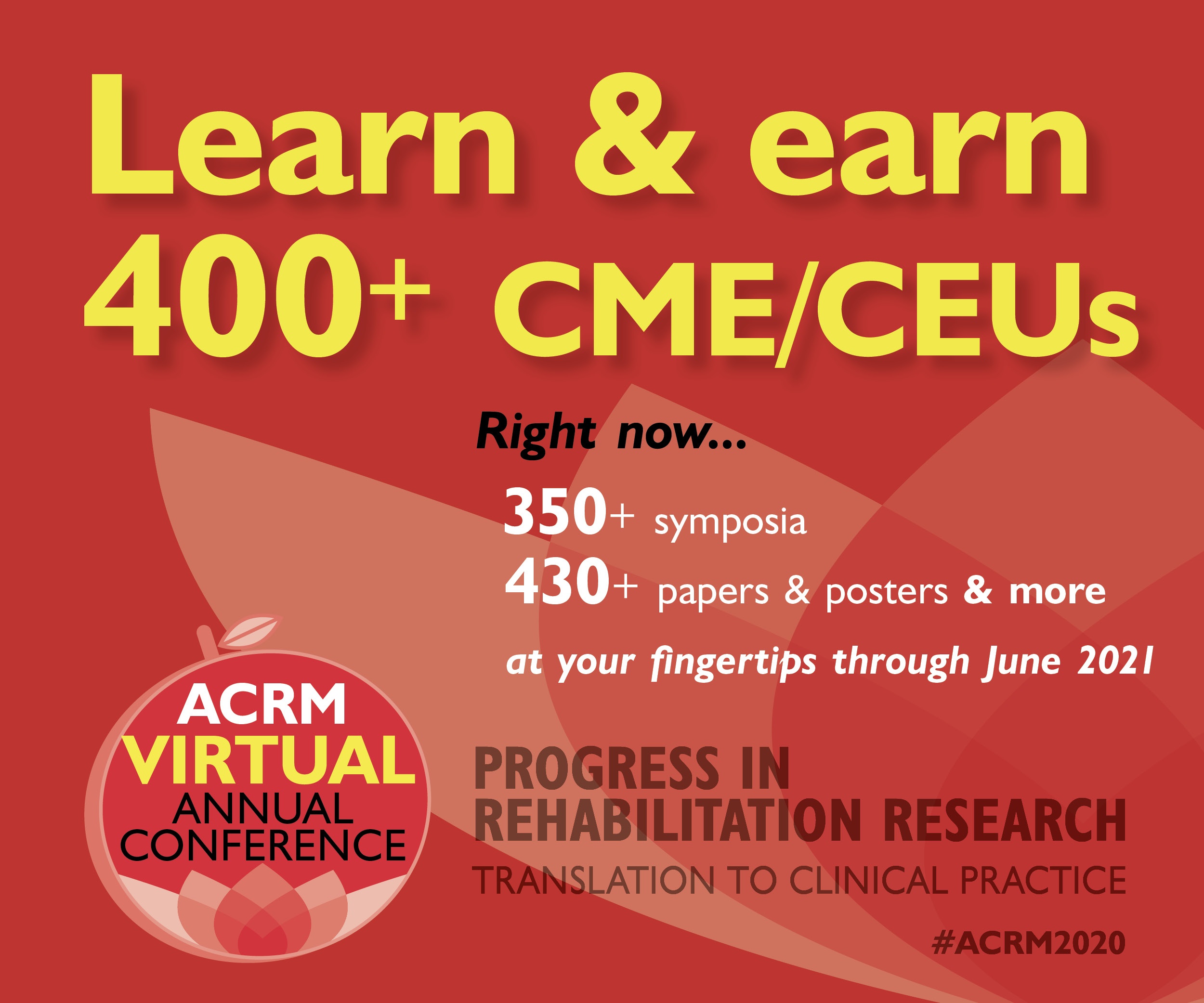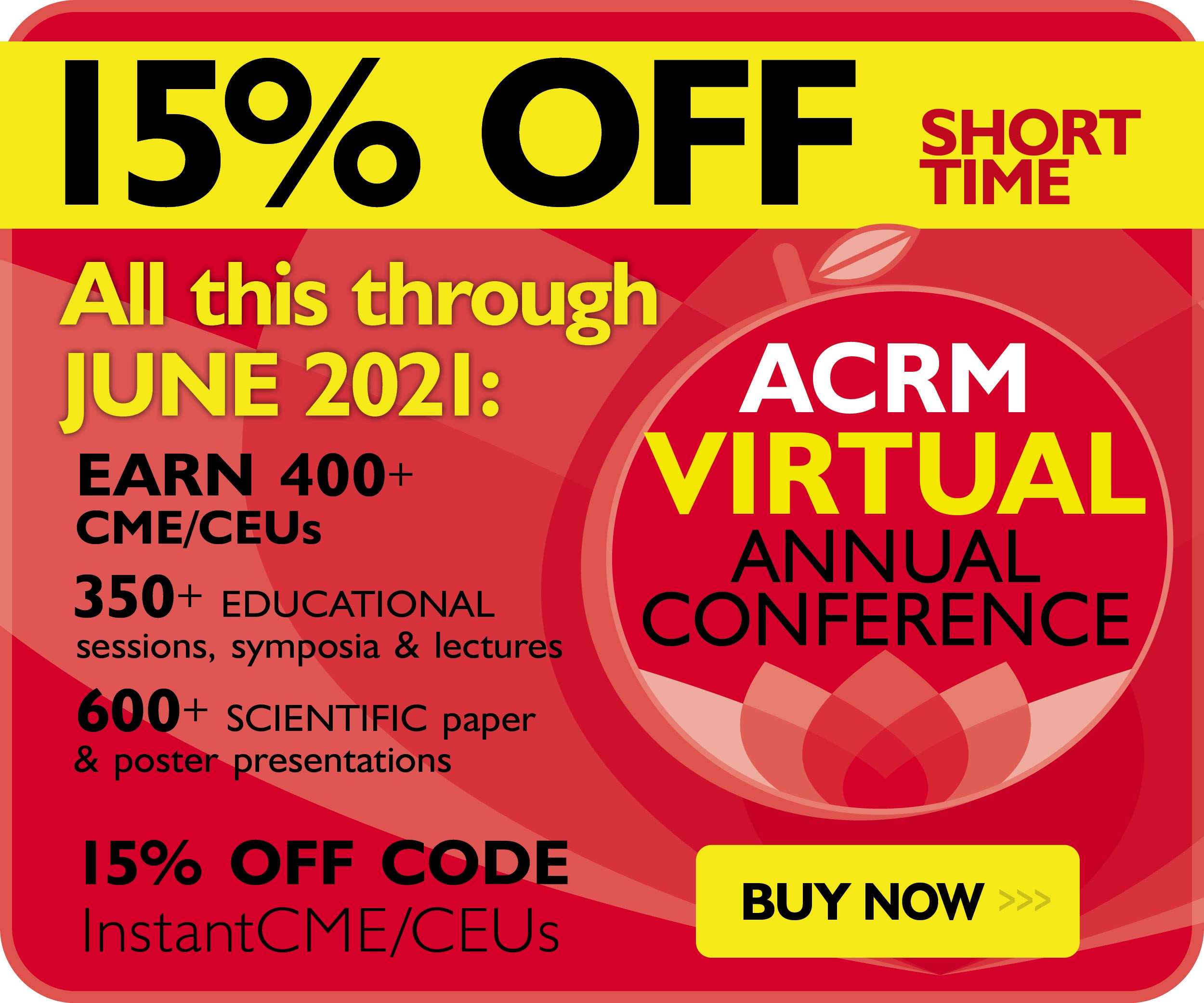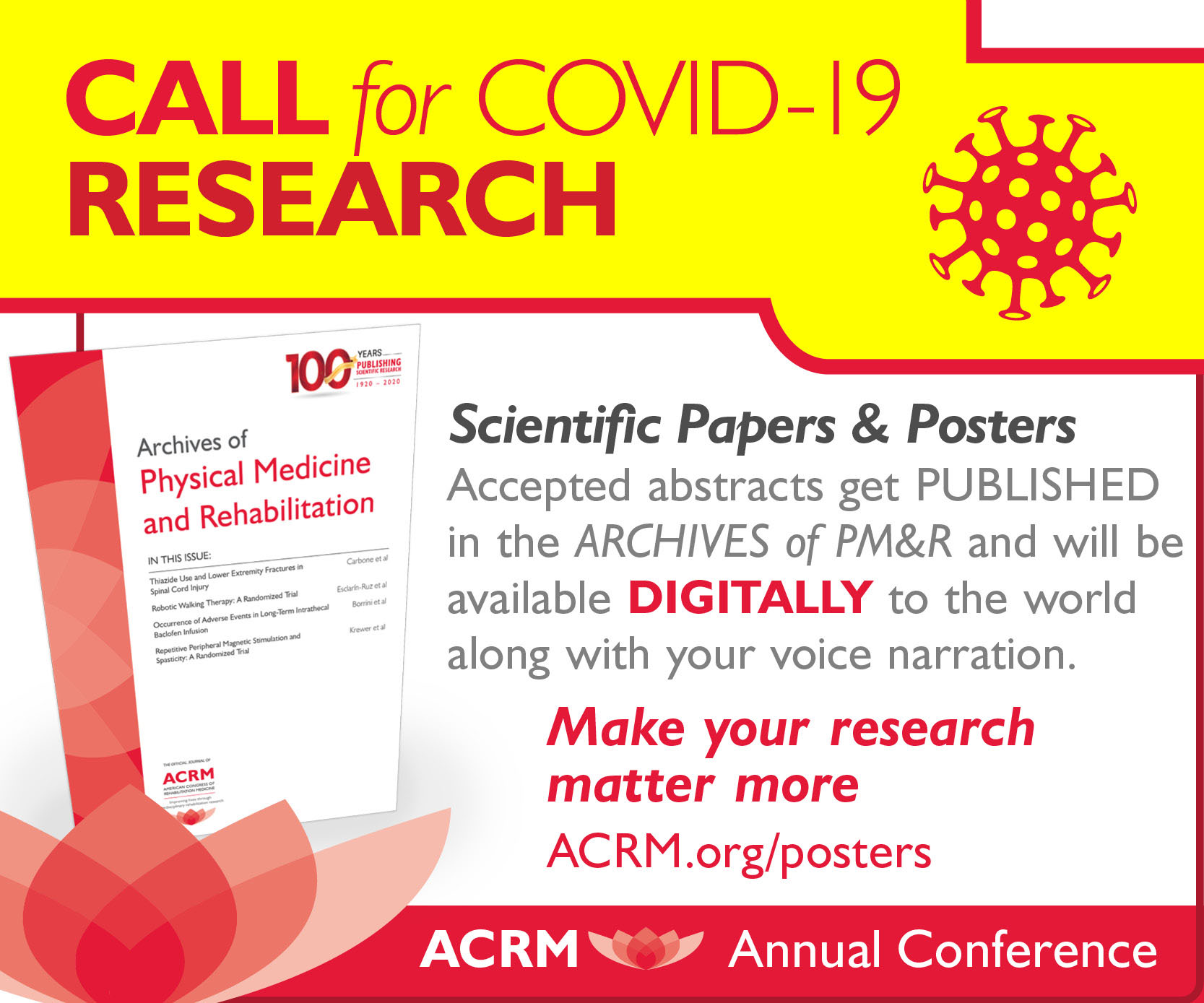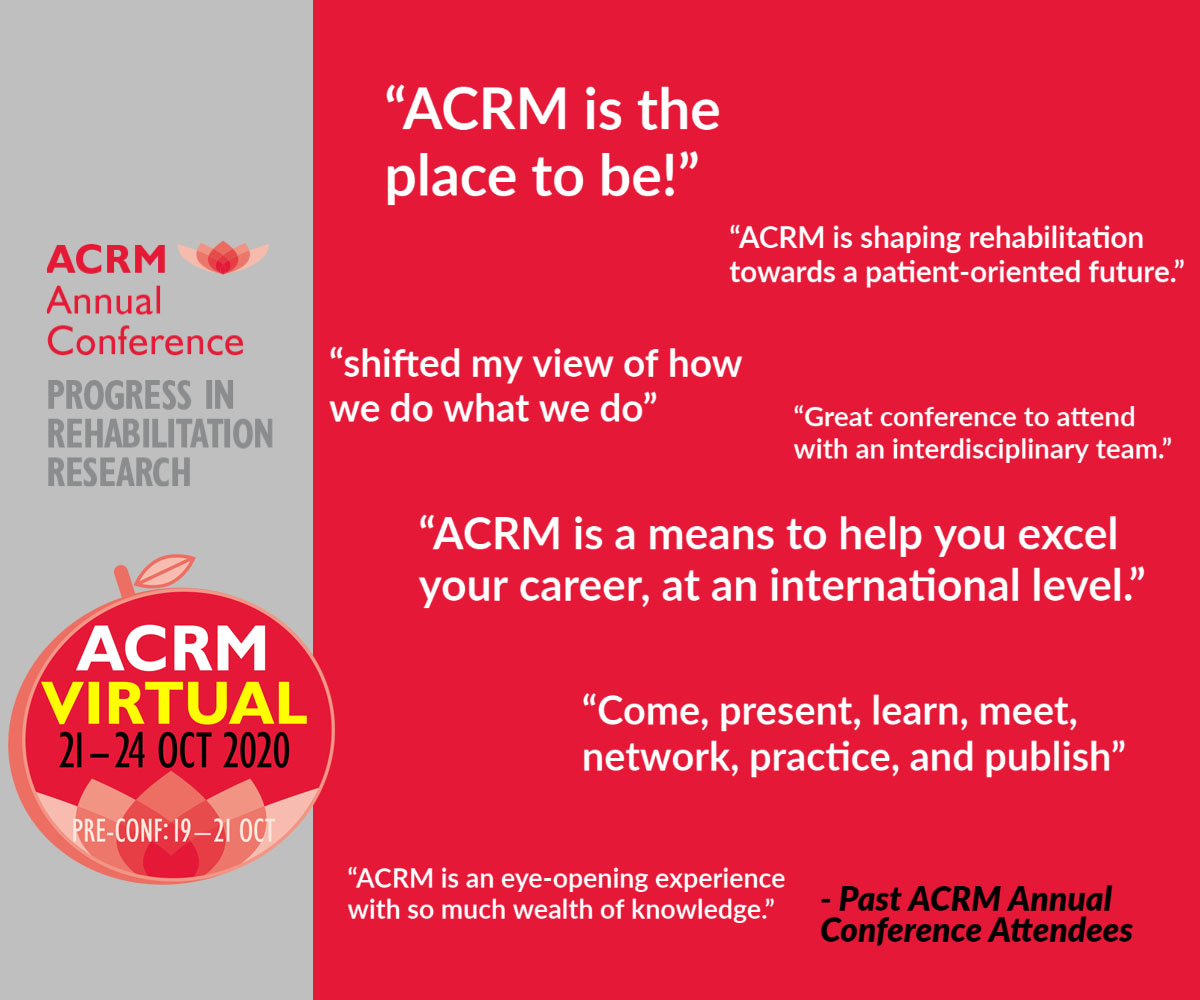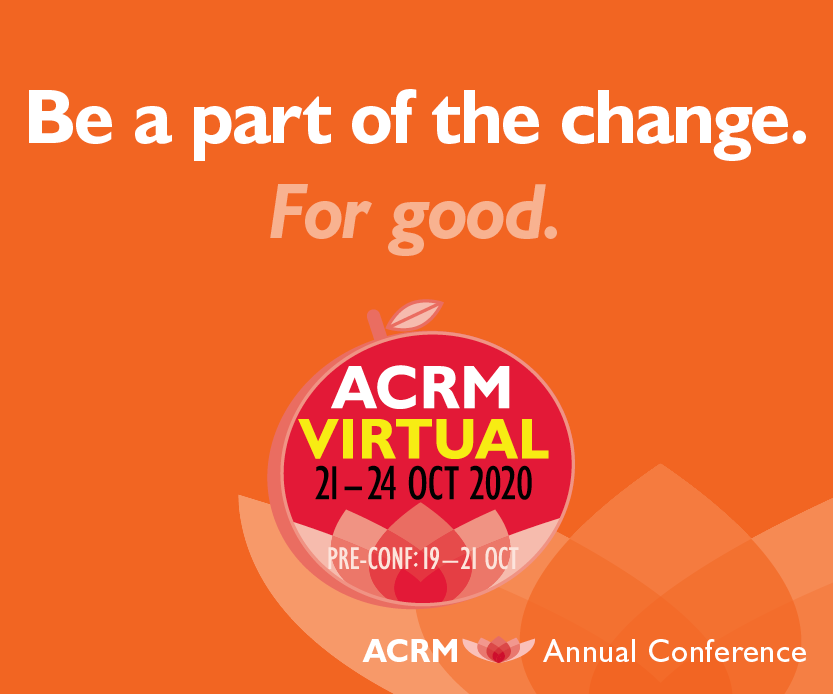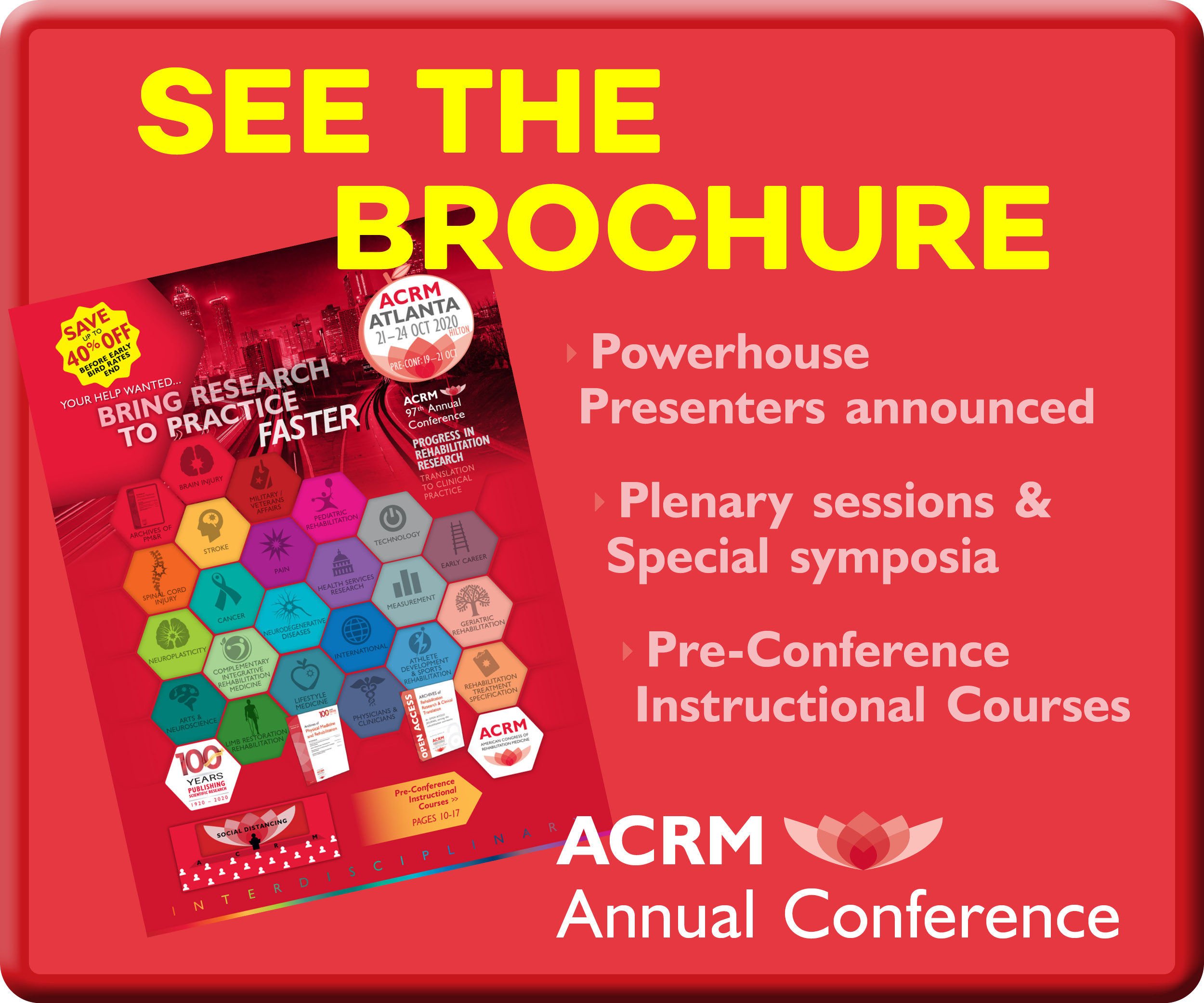Lecture Luncheons
Add up to two Lecture Luncheons to your registration and earn an hour of continuing education credit for each. These popular events keep the education coming while you enjoy a sit-down meal at home and connect with colleagues who share your interests.
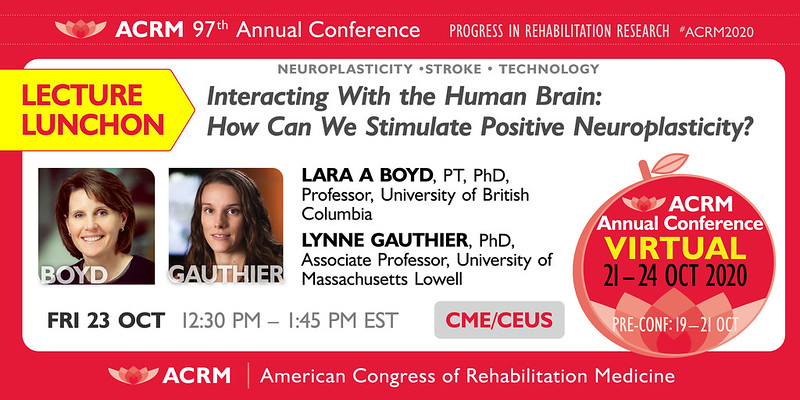
Interacting With the Human Brain: How can we Stimulate Positive Neuroplasticity?
SEE THIS IN THE ONLINE PROGRAM >>
Presenters
Lara A. Boyd, PT, PhD
Professor
University of British Columbia
Lynne Gauthier, PhD
Associate Professor
University of Massachusetts Lowell
Session Description
Recent work demonstrates that the human brain is remarkably neuroplastic. The ability to change, neuroplasticity, enables all learning. To support learning, the brain changes its chemical composition, structure and function. These changes occur at different time scales and in varied combinations. Given that neuroplastic change is happening constantly throughout our life, it is critical that we understand how to both stimulate and harness this capacity for improved behavior. Importantly the most significant driver of change in the human brain is behaviour. Neuroplasticity can be either positive (eg. learning) or negative (eg. chronic pain). Work from my group and others shows that different behaviors/interventions can be paired with skilled motor practice drive neuroplasticity. These include: exercise, brain stimulation, and robotics (among others). We have shown that engaging in a short bout of high intensity aerobic exercise changes patterns of cortical excitability, brain function and stimulates motor memory consolidation, enabling significantly faster learning. Similarly, non-invasive brain stimulation can alter cortical excitability and enhance learning when it is paired with skilled practice; yet the effects of this intervention are highly varied from person to person. One issue that plagues motor learning is the need for very high doses of practice. Work with robotic and video-gaming interventions may offer a method by which this issue can be remediated. This symposium will consider each of these topics. It will focus on how neuroplasticity operates in the human brain and present recent research illustrating what behaviours best stimulate positive change. It will also offer ideas as to how change may be more effectively mapped during practice. This information may be used to advance recovery from brain damage or stimulate learning in healthy brains.
Learning Objectives
-
- Describe the neurobiology of plasticity in the human brain
- Describe how sensory and motor systems interact during learning
- Describe how exercise, brain stimulation, and robotics can stimulate positive neuroplasticity
- Understand how brain damage impacts neuroplastic change
- Consider what behaviors affect neuroplasticity after brain damage
About the Presenters
 Dr. Lara Boyd is a Neuroscientist and Physical Therapist at the University of British Columbia. She is a professor and has held a Canada Research Chair, a Michael Smith Foundation for Health Career Scientist award and been a Peter Wall Scholar. Dr. Boyd directs the Brain Behaviour Lab at the University of British Columbia. Her work is centered on answering the question of what limits, and what facilitates, neuroplasticity. Dr. Boyd also serves as the Health Research Advisor to the Vice President for Research and is the university’s delegate to the Canadians Institutes of Health Research. Her TEDx talk “After this your brain will not be the same” has over 25 million views.
Dr. Lara Boyd is a Neuroscientist and Physical Therapist at the University of British Columbia. She is a professor and has held a Canada Research Chair, a Michael Smith Foundation for Health Career Scientist award and been a Peter Wall Scholar. Dr. Boyd directs the Brain Behaviour Lab at the University of British Columbia. Her work is centered on answering the question of what limits, and what facilitates, neuroplasticity. Dr. Boyd also serves as the Health Research Advisor to the Vice President for Research and is the university’s delegate to the Canadians Institutes of Health Research. Her TEDx talk “After this your brain will not be the same” has over 25 million views.
 Lynne V. Gauthier, PhD, is an Associate Professor in the Department of Physical Therapy and Kinesiology at The University of Massachusetts Lowell and director of the Neurorecovery and Brain Imaging Laboratory. Her research utilizes new motion capture technology and data analytics to derive personalized insights into motor recovery. She also utilizes advanced neuroimaging approaches to better characterize the brain’s response to various motor interventions. Her laboratory has secured 7 years of continuous funding from competitive institutes, including the Patient Centered Outcomes Research Institute and the American Heart Association. Dr Gauthier has served as a peer reviewer for NIH, the American Heart Association, Patient Centered Outcomes Research Institute, and UK Multiple Sclerosis Society. Dr. Gauthier co-chairs the Neuroplasticity working group for the American Congress of Rehabilitation Medicine and is a member of the Stroke Interdisciplinary working group and Technology networking group.
Lynne V. Gauthier, PhD, is an Associate Professor in the Department of Physical Therapy and Kinesiology at The University of Massachusetts Lowell and director of the Neurorecovery and Brain Imaging Laboratory. Her research utilizes new motion capture technology and data analytics to derive personalized insights into motor recovery. She also utilizes advanced neuroimaging approaches to better characterize the brain’s response to various motor interventions. Her laboratory has secured 7 years of continuous funding from competitive institutes, including the Patient Centered Outcomes Research Institute and the American Heart Association. Dr Gauthier has served as a peer reviewer for NIH, the American Heart Association, Patient Centered Outcomes Research Institute, and UK Multiple Sclerosis Society. Dr. Gauthier co-chairs the Neuroplasticity working group for the American Congress of Rehabilitation Medicine and is a member of the Stroke Interdisciplinary working group and Technology networking group.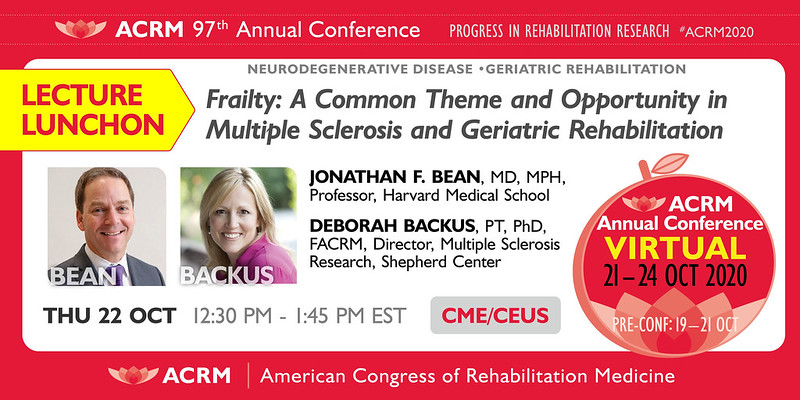
Frailty: A Common Theme and Opportunity in Multiple Sclerosis and Geriatric Rehabilitation
SEE THIS IN THE ONLINE PROGRAM >>
Presenters
Jonathan F. Bean, MD, MPH
Professor
Harvard Medical School
Deborah Backus, PT, PhD, FACRM
Director MS Research
Shepherd Center
Mark A. Hirsch, PhD, FACRM
Senior Scientist
Carolinas Rehabilitation/ Department of Physical Medicine and Rehabilitation
Patricia C. Heyn, PhD, FGSA, FACRM
Associate Professor
University of Colorado Anschutz Medical Campus
Michele K. York, PhD, ABPP-CN
Associate Professor, Section Head, Neuropsychology
Department of Neurology, Baylor College of Medicine
Emily Nalder, PhD, OT Reg. (Ont.)
Asistant Professor
University of Toronto, Department of Occupational Science and Occupation Therapy
Session Description
The Neurodegenerative Diseases and Geriatric Rehabilitation Networking Group are excited to invite you to our 2020 ACRM Lecture Luncheon Symposium titled: Frailty: A common theme and opportunity in multiple sclerosis and geriatric rehabilitation. Dr. Jonathan Bean will summarize the preeminent conceptual models of frailty within geriatric care and how they relate to conceptual models of disablement guiding rehabilitative care. Evidence for exercise and new opportunities for innovations in rehabilitative care and research targeting frailty outcomes will be identified. Dr. Deborah Backus will discuss variables associated with risk of frailty in people with MS and suggest evidence-based approaches to preventing this slow and steady decline in function in people with MS, the role of exercise and rehabilitation strategies for optimizing health and function in people with MS, with specific focus on the meaningfulness of a trial evaluating comparative effectiveness of modes of delivery of an exercise program for people with MS.
Learning Objectives
-
- Define frailty and discuss how these concepts overlap or diverge in the multiple sclerosis (MS) and geriatric populations
- Discuss the rationale and importance for considering frailty and progressive functional decline in rehabilitation of people who are aging and/or are experiencing progression of disability due to MS
- Describe the opportunities for rehabilitation medicine to improve care and prevent or slow frailty and progressive dwindling in the MS and geriatric populations
About the Presenters
 Dr. Jonathan F. Bean is a Professor in the Department of Physical Medicine and Rehabilitation at Harvard Medical School. He is the Director of the New England Geriatric Research Education and Clinical Center (NEGRECC) at the VA Boston Healthcare System and on staff at Spaulding Rehabilitation Hospital. Dr. Bean is an internationally recognized expert in geriatric rehabilitation. His work focuses on developing new approaches to care that optimizes independence and prevents disability for older adults.
Dr. Jonathan F. Bean is a Professor in the Department of Physical Medicine and Rehabilitation at Harvard Medical School. He is the Director of the New England Geriatric Research Education and Clinical Center (NEGRECC) at the VA Boston Healthcare System and on staff at Spaulding Rehabilitation Hospital. Dr. Bean is an internationally recognized expert in geriatric rehabilitation. His work focuses on developing new approaches to care that optimizes independence and prevents disability for older adults.
 Deborah Backus, PT, PhD, FACRM is a grant-funded investigator, physical therapist, and educator with 30+ years of experience in the neurorehabilitation field. Her mission is to empower patients, students and colleagues to achieve their greatest potential, and to advance rehabilitation science and care. As Director of Multiple Sclerosis Research at the Shepherd Center in Atlanta, Georgia, Dr. Backus’s research activities have a broad scope that includes facilitating pharmacologic and device-related clinical trials for multiple sclerosis (MS). Her specific research agenda focuses on investigation of models of care and rehabilitation interventions to facilitate greater function, health and quality of life in people with MS. At Shepherd she has been instrumental in facilitating clinician involvement in research activities, translation of evidence into practice, uptake of technology into clinical programs, and incorporating standardized outcome assessment into routine clinical practice to better guide clinical care. Dr. Backus is currently PI for one of the largest PCORI-funded trials in MS evaluating the comparative effectiveness of an evidence based exercise program delivered in a facility or in the home. She has also received funding from the National MS Society, NIH and NIDILRR. Dr. Backus currently serves as one of the founding editors for the Archives of Rehabilitation Research & Clinical Translation and is Past President of the ACRM (www.acrm.org), both of which serve the rehabilitation community to empower people with disability to live full and healthy lives.
Deborah Backus, PT, PhD, FACRM is a grant-funded investigator, physical therapist, and educator with 30+ years of experience in the neurorehabilitation field. Her mission is to empower patients, students and colleagues to achieve their greatest potential, and to advance rehabilitation science and care. As Director of Multiple Sclerosis Research at the Shepherd Center in Atlanta, Georgia, Dr. Backus’s research activities have a broad scope that includes facilitating pharmacologic and device-related clinical trials for multiple sclerosis (MS). Her specific research agenda focuses on investigation of models of care and rehabilitation interventions to facilitate greater function, health and quality of life in people with MS. At Shepherd she has been instrumental in facilitating clinician involvement in research activities, translation of evidence into practice, uptake of technology into clinical programs, and incorporating standardized outcome assessment into routine clinical practice to better guide clinical care. Dr. Backus is currently PI for one of the largest PCORI-funded trials in MS evaluating the comparative effectiveness of an evidence based exercise program delivered in a facility or in the home. She has also received funding from the National MS Society, NIH and NIDILRR. Dr. Backus currently serves as one of the founding editors for the Archives of Rehabilitation Research & Clinical Translation and is Past President of the ACRM (www.acrm.org), both of which serve the rehabilitation community to empower people with disability to live full and healthy lives.
 Mark A. Hirsch, PhD is Senior Scientist, Carolinas Rehabilitation, Department of PM&R, Director, Parkinson and Movement Disorders Lab, Adjunct Associate Professor, University of North Carolina, Charlotte campus. He completed NIH-T32 fellowship training in neurorehabilitation research at Johns Hopkins School of Medicine, PMR (Professor Barbara J deLateur, mentor) (96-99). He received advanced training in movement disorders in the Department of Neurology at Heinrich-Heine University of Dusseldorf, Germany (Professor Harald Hefter, MD, PhD, mentor) (2000). He conducted pioneering NIH funded research in the area of political participation (voting) and traumatic brain injury. His current research is in gait and balance, mostly in Parkinson’s disease. Dr. Hirsch has made seminal scientific contributions in the area of exercise and Parkinson’s disease. He also pioneered the study of Parkinson patient/provider /scientist collaboration. He works with doctors and therapists who want to give patients a more active role in their health care, and he promotes cooperation in the health care system. He calls the system he envisions “participatory healthcare”. His work on physical activity promotion and brain neurotrophins has been critical in the field of neurorehabilitation. His experience with developing regionalized professional collaborative networks to improve the quality of care in PD is one of the largest in the world. Together with Dr. Sanjay Iyer, he established the Parkinson Network at Carolinas Medical Center in 2007, which received funding from the Park Foundation in 2012, and became known as RENEW Carolinas Parkinson Initiative. RENEW has received awards for its innovation and patient care, including the Ray of Hope Award in 2016. Dr. Hirsch is active on boards internationally including the International Association of Parkinsonism and Related Disorders, Geriatric Rehabilitation, and the American Congress of Rehabilitation Medicine (ACRM). He joined the ACRM in 2008 and the ACRM Neurodegenerative Diseases Networking Group in 2013 (Chair 2018-2020). In 2016 Hirsch and the NDNG Awards Task Force developed the NDNG-level Women in Rehabilitation Science Symposium and a new international award to acknowledge world-class rehabilitation research conducted by a female scientist in the field of rehabilitation science, The NDNG-level Women in ND Science Award and the ACRM-level Women in Rehabilitation Science Award. Hirsch is active on the ACRM AdHoc Committee on Diversity, ACRM Program Committee, AdHoc ACRM Committee to Review Group Configuration, and ACRM Chairs of Councils.
Mark A. Hirsch, PhD is Senior Scientist, Carolinas Rehabilitation, Department of PM&R, Director, Parkinson and Movement Disorders Lab, Adjunct Associate Professor, University of North Carolina, Charlotte campus. He completed NIH-T32 fellowship training in neurorehabilitation research at Johns Hopkins School of Medicine, PMR (Professor Barbara J deLateur, mentor) (96-99). He received advanced training in movement disorders in the Department of Neurology at Heinrich-Heine University of Dusseldorf, Germany (Professor Harald Hefter, MD, PhD, mentor) (2000). He conducted pioneering NIH funded research in the area of political participation (voting) and traumatic brain injury. His current research is in gait and balance, mostly in Parkinson’s disease. Dr. Hirsch has made seminal scientific contributions in the area of exercise and Parkinson’s disease. He also pioneered the study of Parkinson patient/provider /scientist collaboration. He works with doctors and therapists who want to give patients a more active role in their health care, and he promotes cooperation in the health care system. He calls the system he envisions “participatory healthcare”. His work on physical activity promotion and brain neurotrophins has been critical in the field of neurorehabilitation. His experience with developing regionalized professional collaborative networks to improve the quality of care in PD is one of the largest in the world. Together with Dr. Sanjay Iyer, he established the Parkinson Network at Carolinas Medical Center in 2007, which received funding from the Park Foundation in 2012, and became known as RENEW Carolinas Parkinson Initiative. RENEW has received awards for its innovation and patient care, including the Ray of Hope Award in 2016. Dr. Hirsch is active on boards internationally including the International Association of Parkinsonism and Related Disorders, Geriatric Rehabilitation, and the American Congress of Rehabilitation Medicine (ACRM). He joined the ACRM in 2008 and the ACRM Neurodegenerative Diseases Networking Group in 2013 (Chair 2018-2020). In 2016 Hirsch and the NDNG Awards Task Force developed the NDNG-level Women in Rehabilitation Science Symposium and a new international award to acknowledge world-class rehabilitation research conducted by a female scientist in the field of rehabilitation science, The NDNG-level Women in ND Science Award and the ACRM-level Women in Rehabilitation Science Award. Hirsch is active on the ACRM AdHoc Committee on Diversity, ACRM Program Committee, AdHoc ACRM Committee to Review Group Configuration, and ACRM Chairs of Councils. Dr. Patricia C. Heyn has been involved in applied rehabilitation and health sciences research for over 20 years. Her investigations related to (1) promoting healthy lifestyle behavior; (2) preventing or delaying the onset of Alzheimer’s disease with exercise and/or cognitive training; (3) evaluating protective/risk factors associated to cognitive decline; (4) early detection of cognitive decline including mobility impairments; and (5) evaluating emerging technologies for individuals with cognitive impairments has been funded by the National Institutes of Health, U.S. Department of Health and Human Services Administration for Community Living, Coleman Institute, and the J.T. Tai Foundation. She has distinctive knowledge in evidence-based methodologies and clinical guideline practices. Her meta-analysis study on the effects of exercise training for individuals with dementia is recognized as one of the most cited articles from the Archives of Physical Medicine and Rehabilitation and is highly scored in Altmetric. She is well-known for developing effective mentored evidence-based clinical scientist training programs (i.e. PMID: 26472583, PMID: 24569702 and PMID: 30605502, PMID: 29568518 ) and she received several awards and honorable mentions for her mentoring. Currently, Dr. Heyn’s research is impacting clinical care research and practice for individuals growing older with pediatric-onset disabilities (i.e. PMID: 30663044, PMCID: PMC6227293) that has the goal to improve the person’s healthspan, everyday function, quality of life and societal engagement as they grow older. She has extensive expertise in designing behavioral randomized trials for individuals with complex health conditions, including from minority and underserved backgrounds. She has published more than 90 peer-reviewed papers, abstracts, and book chapters and she has mentored more than 50 clinical scientists, graduate and medical trainees. She is eminent for her effective mentoring style and for producing creative science teams and multidisciplinary collaborations with the goal to solve complex healthcare problems. Her investigations include mix-methods and longitudinal design as well as person-centered health outcomes with the investigators from the University of Colorado School of Medicine, College of Engineering and Applied Sciences, Children’s Hospital Colorado, Rocky Mountain Alzheimer’s Disease Clinical and Research Center and the Rocky Mountain U.S. Cochrane Affiliated Center. Dr. Heyn is an elected fellow of the American Congress of Rehabilitation Medicine (ACRM), Gerontological Society of America (GSA), and the NIH NIDDK The Network of Minority Health Research Investigators (NIH NDDK NMRI). She is the editor for the review articles section of The Gerontologist as well as the Archives of Physical Medicine and Rehabilitation, Journal of Physical Activity and Aging, and Topics in Geriatric Rehabilitation. In addition, she serves on several editorial and study section boards. She has a strong national reputation and holds key leadership roles in many professional organizations such as the 1) Director of the Gerontological Society of America NIA R13 Mentoring Workshop; 2) Co-Chair of the Aging Interest Group of the American College of Sports Medicine; 3) Chair-Elect of the ACRM Geriatric Rehabilitation Networking Group (GRNG); 4) Co-Chair and founder of the Complementary and Integrated Rehabilitation Medicine Group; 5) Program Chair of the International Alzheimer’s Association (PIA) Non-Pharmacological Group and 6) Program Committee Chair of the NIH/NIDDK NMRI Workshop. She has been involved in several international academic programs and her research was featured in the La Nación, Argentina’s leading newspaper and is frequently cited in various media such as HealingWell.com, WIKIBOOKS, ABC 7 News and the Alzheimer’s Association.
Dr. Patricia C. Heyn has been involved in applied rehabilitation and health sciences research for over 20 years. Her investigations related to (1) promoting healthy lifestyle behavior; (2) preventing or delaying the onset of Alzheimer’s disease with exercise and/or cognitive training; (3) evaluating protective/risk factors associated to cognitive decline; (4) early detection of cognitive decline including mobility impairments; and (5) evaluating emerging technologies for individuals with cognitive impairments has been funded by the National Institutes of Health, U.S. Department of Health and Human Services Administration for Community Living, Coleman Institute, and the J.T. Tai Foundation. She has distinctive knowledge in evidence-based methodologies and clinical guideline practices. Her meta-analysis study on the effects of exercise training for individuals with dementia is recognized as one of the most cited articles from the Archives of Physical Medicine and Rehabilitation and is highly scored in Altmetric. She is well-known for developing effective mentored evidence-based clinical scientist training programs (i.e. PMID: 26472583, PMID: 24569702 and PMID: 30605502, PMID: 29568518 ) and she received several awards and honorable mentions for her mentoring. Currently, Dr. Heyn’s research is impacting clinical care research and practice for individuals growing older with pediatric-onset disabilities (i.e. PMID: 30663044, PMCID: PMC6227293) that has the goal to improve the person’s healthspan, everyday function, quality of life and societal engagement as they grow older. She has extensive expertise in designing behavioral randomized trials for individuals with complex health conditions, including from minority and underserved backgrounds. She has published more than 90 peer-reviewed papers, abstracts, and book chapters and she has mentored more than 50 clinical scientists, graduate and medical trainees. She is eminent for her effective mentoring style and for producing creative science teams and multidisciplinary collaborations with the goal to solve complex healthcare problems. Her investigations include mix-methods and longitudinal design as well as person-centered health outcomes with the investigators from the University of Colorado School of Medicine, College of Engineering and Applied Sciences, Children’s Hospital Colorado, Rocky Mountain Alzheimer’s Disease Clinical and Research Center and the Rocky Mountain U.S. Cochrane Affiliated Center. Dr. Heyn is an elected fellow of the American Congress of Rehabilitation Medicine (ACRM), Gerontological Society of America (GSA), and the NIH NIDDK The Network of Minority Health Research Investigators (NIH NDDK NMRI). She is the editor for the review articles section of The Gerontologist as well as the Archives of Physical Medicine and Rehabilitation, Journal of Physical Activity and Aging, and Topics in Geriatric Rehabilitation. In addition, she serves on several editorial and study section boards. She has a strong national reputation and holds key leadership roles in many professional organizations such as the 1) Director of the Gerontological Society of America NIA R13 Mentoring Workshop; 2) Co-Chair of the Aging Interest Group of the American College of Sports Medicine; 3) Chair-Elect of the ACRM Geriatric Rehabilitation Networking Group (GRNG); 4) Co-Chair and founder of the Complementary and Integrated Rehabilitation Medicine Group; 5) Program Chair of the International Alzheimer’s Association (PIA) Non-Pharmacological Group and 6) Program Committee Chair of the NIH/NIDDK NMRI Workshop. She has been involved in several international academic programs and her research was featured in the La Nación, Argentina’s leading newspaper and is frequently cited in various media such as HealingWell.com, WIKIBOOKS, ABC 7 News and the Alzheimer’s Association.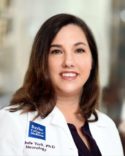 Michele K. York, PhD, ABPP-CN is a Board certified Neuropsychologist, an Associate Professor of Neurology and Psychiatry and Section Head of Neuropsychology in the Department of Neurology at Baylor College of Medicine. She is also the Neuropsychologist for the Parkinson’s Disease Research Education and Clinical Center at the VA. Dr. York earned a master’s degree and doctorate in Clinical Psychology from Vanderbilt University in Nashville, TN. Her extensive training includes an internship in Clinical Psychology/Neuropsychology and a postdoctoral fellowship in Neuropsychology at BCM. Dr. York’s clinical specialties include neuropsychological evaluation of adults with movement disorders, including patients with deep brain stimulation, and the differential diagnosis of dementias. She has been awarded four Faculty Excellence Awards for Teaching and Evaluation and Enduring Materials and is the Director of Neuropsychology training at BCM. Dr. York is the Co-Chair elect and Chair of the Awards/Programming Task Force of the Neurodegenerative Diseases Networking Group of the American Congress of Rehabilitation Medicine.
Michele K. York, PhD, ABPP-CN is a Board certified Neuropsychologist, an Associate Professor of Neurology and Psychiatry and Section Head of Neuropsychology in the Department of Neurology at Baylor College of Medicine. She is also the Neuropsychologist for the Parkinson’s Disease Research Education and Clinical Center at the VA. Dr. York earned a master’s degree and doctorate in Clinical Psychology from Vanderbilt University in Nashville, TN. Her extensive training includes an internship in Clinical Psychology/Neuropsychology and a postdoctoral fellowship in Neuropsychology at BCM. Dr. York’s clinical specialties include neuropsychological evaluation of adults with movement disorders, including patients with deep brain stimulation, and the differential diagnosis of dementias. She has been awarded four Faculty Excellence Awards for Teaching and Evaluation and Enduring Materials and is the Director of Neuropsychology training at BCM. Dr. York is the Co-Chair elect and Chair of the Awards/Programming Task Force of the Neurodegenerative Diseases Networking Group of the American Congress of Rehabilitation Medicine. Dr. Emily Nalder is an Assistant Professor in the Department of Occupational Science & Occupational Therapy and at the University of Toronto. She holds the March of Dimes Canada Paul J.J. Martin Early Career Professorship and a Canada Research Chair (Tier 2) in Resiliency and Rehabilitation. She is a licensed occupational therapist in Ontario, Canada, and holds affiliate appointments with the Toronto Rehabilitation Institute and the Rotman Research Institute at Baycrest Health Sciences in Toronto. Dr. Nalder’s research has been funded by the Canadian Institutes of Health Research, Ontario Neurotrauma Foundation, Quebec Rehabilitation Research Network and the Canadian Social Sciences and Humanities Research Council. She has been the recipient of several early career awards, including the Deborah L. Wilkerson Early Career Award from the American Congress of Rehabilitation Medicine and an Early Researcher Award from the Ontario Ministry of Economic Development, Job Creation and Trade. Her scholarship focuses on understanding the complex factors related to people, environments, health services, and technology that influence community integration, and resiliency of individuals with cognitive impairment. An expert in rehabilitation science and occupational therapy, Nalder is exploring the links between participation in life situations and resiliency (the processes through which we adapt to life challenges). Using a “life course” perspective to examine and understand how individuals adapt during life transitions that can arise when living with cognitive disability. At the same time, she’s developing new rehabilitation interventions that are informed by resiliency theories and that can enhance participation.
Dr. Emily Nalder is an Assistant Professor in the Department of Occupational Science & Occupational Therapy and at the University of Toronto. She holds the March of Dimes Canada Paul J.J. Martin Early Career Professorship and a Canada Research Chair (Tier 2) in Resiliency and Rehabilitation. She is a licensed occupational therapist in Ontario, Canada, and holds affiliate appointments with the Toronto Rehabilitation Institute and the Rotman Research Institute at Baycrest Health Sciences in Toronto. Dr. Nalder’s research has been funded by the Canadian Institutes of Health Research, Ontario Neurotrauma Foundation, Quebec Rehabilitation Research Network and the Canadian Social Sciences and Humanities Research Council. She has been the recipient of several early career awards, including the Deborah L. Wilkerson Early Career Award from the American Congress of Rehabilitation Medicine and an Early Researcher Award from the Ontario Ministry of Economic Development, Job Creation and Trade. Her scholarship focuses on understanding the complex factors related to people, environments, health services, and technology that influence community integration, and resiliency of individuals with cognitive impairment. An expert in rehabilitation science and occupational therapy, Nalder is exploring the links between participation in life situations and resiliency (the processes through which we adapt to life challenges). Using a “life course” perspective to examine and understand how individuals adapt during life transitions that can arise when living with cognitive disability. At the same time, she’s developing new rehabilitation interventions that are informed by resiliency theories and that can enhance participation.
